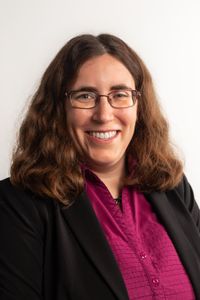Amy Freeland
Amy Freeland (Democratic Party) ran for election to the Missouri House of Representatives to represent District 140. She lost in the general election on November 8, 2022.
Freeland completed Ballotpedia's Candidate Connection survey in 2022. Click here to read the survey answers.
Biography
Amy Freeland was born in Baltimore, Maryland. She earned a bachelor's degree from Drury University in 2009. Her career experience includes working as a quality assurance analyst.[1]
Elections
2022
See also: Missouri House of Representatives elections, 2022
General election
General election for Missouri House of Representatives District 140
Jamie Ray Gragg defeated Amy Freeland in the general election for Missouri House of Representatives District 140 on November 8, 2022.
Candidate | % | Votes | ||
| ✔ |  | Jamie Ray Gragg (R)  | 77.3 | 10,605 |
 | Amy Freeland (D)  | 22.7 | 3,115 | |
| Total votes: 13,720 | ||||
 = candidate completed the Ballotpedia Candidate Connection survey. = candidate completed the Ballotpedia Candidate Connection survey. | ||||
| If you are a candidate and would like to tell readers and voters more about why they should vote for you, complete the Ballotpedia Candidate Connection Survey. | ||||
Do you want a spreadsheet of this type of data? Contact our sales team. | ||||
Democratic primary election
Democratic primary for Missouri House of Representatives District 140
Amy Freeland advanced from the Democratic primary for Missouri House of Representatives District 140 on August 2, 2022.
Candidate | % | Votes | ||
| ✔ |  | Amy Freeland  | 100.0 | 799 |
| Total votes: 799 | ||||
 = candidate completed the Ballotpedia Candidate Connection survey. = candidate completed the Ballotpedia Candidate Connection survey. | ||||
| If you are a candidate and would like to tell readers and voters more about why they should vote for you, complete the Ballotpedia Candidate Connection Survey. | ||||
Do you want a spreadsheet of this type of data? Contact our sales team. | ||||
Republican primary election
Republican primary for Missouri House of Representatives District 140
Jamie Ray Gragg defeated Danny Garrison in the Republican primary for Missouri House of Representatives District 140 on August 2, 2022.
Candidate | % | Votes | ||
| ✔ |  | Jamie Ray Gragg  | 60.4 | 3,159 |
 | Danny Garrison | 39.6 | 2,067 | |
| Total votes: 5,226 | ||||
 = candidate completed the Ballotpedia Candidate Connection survey. = candidate completed the Ballotpedia Candidate Connection survey. | ||||
| If you are a candidate and would like to tell readers and voters more about why they should vote for you, complete the Ballotpedia Candidate Connection Survey. | ||||
Do you want a spreadsheet of this type of data? Contact our sales team. | ||||
Campaign themes
2022
Ballotpedia survey responses
See also: Ballotpedia's Candidate Connection
Amy Freeland completed Ballotpedia's Candidate Connection survey in 2022. The survey questions appear in bold and are followed by Freeland's responses.
| Collapse all
Christian County is where I have felt the greatest sense of belonging, among neighbors who truly support each other. However, I have noticed a strong disconnect between what residents want and what we get from our elected officials. Our lawmakers tend to ignore their constituents and pass policies that hurt us. I realized someone needed to step up and advocate for us, and I decided to be that someone.
I have worked for years to improve outcomes for people in the Ozarks, engaging with voters about the issues that affect them. My volunteer efforts in the past two election cycles helped to pass community-focused policies, including expanded healthcare access and a higher minimum wage. Still, we have not seen the progress we deserve. I'm passionate about ensuring that my district is and continues to be a great place for kids, seniors, and working families.- Public education is under attack in our county, from book banning to the "school choice" movement (funneling public tax dollars into private schools). I support fully funding public schools, increasing teacher salaries, and trusting locally-elected school boards to mandate school curricula.
- Everyone deserves quality, affordable healthcare. I support lowering health insurance and prescription drug costs, expanding employer-provided health coverage, funding local hospitals, and expanding Medicaid enrollment.
- I will support our economy by prioritizing local businesses and workers' rights above corporate interests. I support limiting business tax contracts that outsource our locally-spent dollars so the money can instead stay in our community.
Healthcare – Ensuring every Missourian has quality, affordable, and accessible healthcare
Jobs – Fighting for workers' rights, supporting small businesses, and bringing new businesses and jobs to our community
Taxes – Lowering taxes for people instead of corporations by stopping corporate tax incentives, investing directly in what people need (public schools, healthcare, roads and bridges), and keeping locally-spent money in our district
Agriculture – Promoting local control and oversight of farms and prioritizing family farms over large corporate operations
Environment – Protecting our land and waterways, combating and mitigating climate change, and promoting renewable energy
Civil Liberties – Passing the Missouri Non-Discrimination Act, protecting 1st Amendment freedoms, and protecting 2nd Amendment freedoms while advancing common-sense reform to address the epidemic of gun violence
Access - Be reachable by your constituents in your public office; be available to take comments, hold open forums, etc.
Honesty - Tell the full truth even if it's uncomfortable and even if it will upset people
Accountability - Admit to and take responsibility for your mistakes; don't pretend to be faultless; be open to learning and growing; be receptive when constituents and others seek to hold you accountable
Tenacity - Don't cave easily to lobbyist, donor, or party pressure; reconsideration of positions should be based on changed circumstances, greater understanding, and/or the will of the people
Morality - Respect fundamental human rights (constitutional rights if "human rights" cannot be agreed upon), even above the will of the people
Representation - Know your constituents; act and speak on behalf of your constituents or in their best interest; be able to dissociate yourself from your constituents (don't be ruled by ego)
Prudence - Don't make rash decisions; exercise reason; when time allows, consider all angles and potential outcomes of a proposed policy
I want to provide voters with a clear choice, since that is the cornerstone of democracy. I want them to know it's not naïve to expect better, because we deserve better. We deserve accountability. At the very least, we shouldn't tolerate being fleeced and ignored.
In talking with my neighbors, I've heard from so many of them that their concerns aren't being addressed by elected officials. They worry about their kids' education as our legislators pass bills to defund our schools. They worry whether their kids will even come home from school as mass shootings continue and our legislators do nothing to stop them. They worry about caring for their families' health as medical costs rise, while our legislators fight against voter-approved Medicaid expansion.
I want my neighbors to know that they can and should expect elected officials to meet their needs. They can and should expect actual representation—regardless of whether they want it from me, regardless if I win or lose, because this isn't about me. I don't aspire to rule or steer my constituents; that's not being a representative. I aspire to empower them.
Throughout my school, like a microcosm of America, hateful sentiments were expressed boldly and seldom reprimanded. Classmates who had never seemed violent before were enthusiastically calling for torture and execution, not just of terrorists. One teacher started playing hyper-nationalistic music to her classes under the guise of patriotism. Someone I had considered a good friend told me with a smile that anyone who didn't believe in Christianity should leave the country.
I couldn't explain it at the time, but I understand now that the vitriol was stoked and justified by fear. In this case, it was OK to hate an entire ethnic or religious group simply for fear they might be terrorists, regardless of how extremely unlikely that was.
His wife was in the hospital, and his foremost concern was paying for her care. But the houses in his neighborhood, including theirs, had been bought out by a corporation that raised everyone's rent more than 40%. Most of his neighbors had effectively been run out of town because they couldn't afford to live there anymore. He worried he'd have to move soon too. He had personally witnessed the new owners scouring the community for “For Sale” properties and declaring their intention to buy each and every one. That's how he realized these weren't locally-invested business owners but (in his words) “puppets for a corporation.” One with an endless stream of money and far more interest in profit than human welfare.
Listening to this man's story, I was heartbroken by how resigned he seemed. He wasn't angry, he wasn't scared, he was simply telling me how things were. Indeed, it would have done no good to get emotional because he couldn't stop any of it from happening. Instead of being able to enjoy their retirement, this man and his hospitalized wife had to adapt or else be crushed by the engine of corporate greed.
When I say we must prioritize people over corporations, THIS is what I mean. Corporations dazzle us with dollar signs so we can't see what they're really doing: tearing apart communities and driving our neighbors to destitution. The myth that corporate wealth will trickle down to the people is easily disproven, everywhere you look. Worst of all, stories like this are so commonplace that we just accept them as inevitable.
Before compromising, all sides should have the opportunity to articulate what they are unwilling to compromise on and the opportunity to define and agree upon a middle ground between the different sides. Too often, once side 1 has agreed to compromise, side 2 will demand that side 1 compromise more and more, then accuse side 1 of being unwilling to compromise at all the minute side 1 stops compromising. When that happens, all sides need to be able to take a step back and assess where they are in relation to the middle and the extremes, so they can identify and address any imbalance.
Note: Ballotpedia reserves the right to edit Candidate Connection survey responses. Any edits made by Ballotpedia will be clearly marked with [brackets] for the public. If the candidate disagrees with an edit, he or she may request the full removal of the survey response from Ballotpedia.org. Ballotpedia does not edit or correct typographical errors unless the candidate's campaign requests it.
See also
2022 Elections
External links
Footnotes
- ↑ Information submitted to Ballotpedia through the Candidate Connection survey on July 4, 2022








